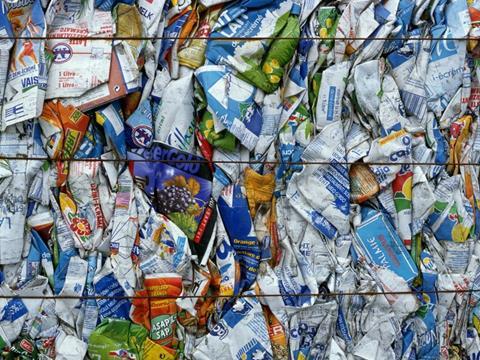
Germany-based EEW Energy from Waste GmbH (EEW) and DSD - Duales System Holding GmbH & Co. KG have announced plans to jointly develop a a procedure for processing mixed plastics and other residues from consumer packaging waste. The aim is to obtain large quantities of plastic waste for chemical recycling that currently cannot be recycled for technical or economic reasons.
The two companies have agreed to establish a joint venture. By the end of 2021, the aim is to develop a technically and economically viable procedure for processing 200,000 metric tons of plastic waste per year in a plant to be built and operated jointly. The input materials are to be obtained from DSD and EEW's waste streams.
Michael Wiener, CEO Der Grüne Punkt, explains: "With this joint venture, we are creating a solution for plastic waste which cannot be recycled but which generally end up being incinerated in cement or waste incineration plants. We are complementing our highly developed processes for mechanical recycling with a completely new processing method. This will enable us to offer our customers an even broader range of services in the future. The model developed as part of the joint venture also opens a path to climate-friendly recycling for challenging plastic waste."
Bernard M. Kemper, CEO EEW GmbH, adds: "With this cooperation, companies in the field of material and energy recycling are joining forces for the first time to strengthen chemical recycling and thus further close the raw material cycle. We will succeed by obtaining raw materials from the waste stream of mixed plastics and sorting residues as a starting basis for new products. To this end, EEW will intensify its recycling efforts upstream of the energy recovery process and recover waste previously used for energy generation for the raw material cycle. In a nutshell, our joint venture stands for more and better recycling, for which we use our sites and our technical know-how to reach a sustainable circular economy." Mixed plastics from recycling bins or yellow bags (used in Germany to collect packaging made of plastic, metal or composite materials), residue containing plastics from the sorting of lightweight packaging from the dual system and processing residues from the two plastic recycling plants of Grüner Punkt will be used for the planned processing procedure. EEW will filter out plastic waste contained in household waste before it is recycled for energy in its plants, thus making these quantities available for chemical recycling. In a further step, a service provider will chemically recycle the plastic waste processed by the cooperation partners EEW and DSD. This will involve a process known as oiling, for example by means of pyrolysis. The pyrolysis oil obtained will be marketed by the joint venture as a basic material for the production of high-purity and food-grade plastics for the production of packaging, for example to manufacturers of branded goods. Manufacturers would thus be able to access a raw material that is demonstrably derived from post-consumer waste.













